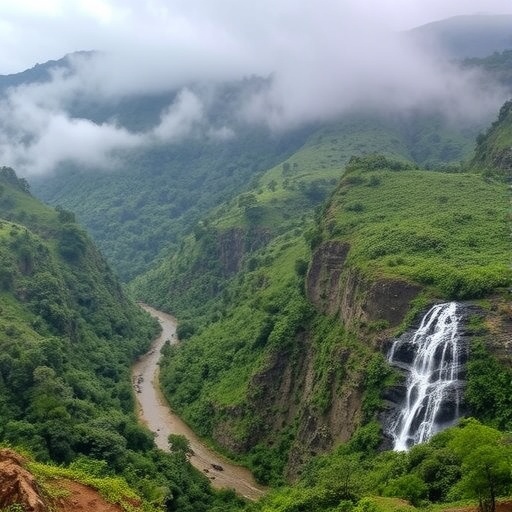In the lush, humid tropical terrains of Sri Lanka, a novel study has shed light on the intricate dynamics of surface water evaporation within mountainous catchments characterized by steep elevation gradients. This research, conducted by a team led by Ekanayake and colleagues, represents a groundbreaking investigation into how elevation influences water loss through evaporation in small, high-altitude catchments—features that are critical yet understudied components of tropical hydrological cycles.
The study zooms into a small mountain catchment in Sri Lanka, a setting that offers a complex interplay between topography, climate, and hydrology. Mountainous regions in the tropics often exhibit unique microclimates driven by rapid changes in elevation, impacting water balance in ways that traditional hydrological models may not adequately capture. By focusing on evaporation losses—one of the dominant pathways for water removal from surface reservoirs—this research offers deep insights into the temporal and spatial heterogeneity of water fluxes in terrains with sharp elevational gradients.
Utilizing a combination of field observations and advanced analytical methods, the team meticulously quantified surface water evaporation over different altitudes within the catchment. Their methodological framework included the deployment of sophisticated evaporation measurement techniques, such as micro-lysimeters and remote sensing tools, allowing for fine-scale resolution of evaporation variability with elevation. These measurements were conducted over significant temporal spans to reflect seasonal fluctuations intertwined with topographic influences.
The findings revealed that evaporation rates from surface water bodies in these mountain catchments are highly sensitive to elevation changes. Higher altitudes, despite their cooler temperatures, exhibited complex patterns of evaporation loss driven by concurrent factors such as wind speed increases and lower air humidity. This non-linear relationship challenges conventional assumptions that evaporation uniformly decreases with elevation due to cooler thermal regimes. Instead, the data pointed to microclimatic drivers that can enhance evaporation processes in unexpected ways at higher tiers of the catchment.
Climate variability, prevalent in this region, further modulated evaporation dynamics. Monsoonal influences and intermittent dry spells created oscillating moisture conditions, which in turn affected the temporal patterns of surface water evaporation. The study unraveled how these climatic rhythms are coupled with elevation-driven microclimates to produce a mosaic of evaporation intensities across the catchment landscape.
Crucially, the study highlighted the significant role of canopy cover and vegetation types in mediating evaporative losses. The humid tropical settings in Sri Lanka are marked by dense, multilayered forests that act as both shields and facilitators of surface evaporation depending on their density and phenology. It was observed that areas with denser canopy experienced reduced direct evaporation from water bodies owing to shading and microhabitat stabilization, whereas open areas suffered higher losses.
The research is particularly relevant given the growing concerns surrounding water resource sustainability in tropical mountain catchments. These environments are crucial freshwater sources for downstream communities, agriculture, and ecosystems. Understanding the nuances of evaporation losses enables better prediction of water availability under changing climatic and land-use scenarios, fostering improved watershed management strategies.
Moreover, the study’s methodological advancements provide a robust template for hydrologists aiming to dissect surface water fluxes in complex terrains. Its integration of ground-based and remote sensing data sets a precedent for future research frameworks aimed at unraveling detailed hydrological processes in similarly challenging environments worldwide.
The implications of these findings ripple beyond hydrology, touching upon ecosystem resilience, forest management, and climate adaptation policies in tropical mountainous regions. By offering a refined comprehension of the surface water balance, the study equips policymakers and conservationists with critical knowledge to anticipate hydrological responses to climatic perturbations.
Notably, the elevation-dependent variability in evaporation identified calls into question the reliability of existing models that tend to generalize evaporation rates across altitudinal gradients. The study advocates for the incorporation of elevation-specific parameters and microclimatic factors into modeling efforts to enhance predictive accuracy in humid tropical mountain watersheds.
Environmental scientists and water resource managers in monsoon-affected tropical zones could leverage these insights to tailor interventions aimed at preserving surface water bodies and mitigating evaporation losses. Such interventions might include strategic afforestation, canopy management, and the design of water storage infrastructure optimized for local climatic and topographic conditions.
The research also opens avenues for exploring how climate change—through its alteration of temperature regimes, humidity patterns, and precipitation seasonality—will reshape evaporation dynamics in tropical mountain catchments. This predictive capability is vital for safeguarding water security in regions where dependence on mountain water sources remains high.
Through its multifaceted examination of evaporation losses, the study accentuates the critical need to view tropical mountain catchments as dynamic systems where elevation, climate, vegetation, and hydrological processes are intertwined. This systemic perspective is indispensable for devising sustainable watershed management practices in the face of mounting environmental challenges.
In summary, Ekanayake et al.’s comprehensive exploration into surface water evaporation along steep elevation gradients in Sri Lanka’s humid tropics stands as a seminal contribution. It not only enriches the scientific understanding of hydrologic processes in mountainous tropical catchments but also equips stakeholders with actionable knowledge to navigate the complex interplay of environmental variables shaping water resources in these ecologically vital regions.
Subject of Research:
Evaporation losses of surface water in a small mountain catchment with a higher elevation gradient in the humid tropical terrain of Sri Lanka.
Article Title:
Evaporation losses of surface water in a small mountain catchment with a higher elevation gradient in the humid tropical terrain of Sri Lanka.
Article References:
Ekanayake, N., Sumudumali, I., Jayawardana, J.M.C.K. et al. Evaporation losses of surface water in a small mountain catchment with a higher elevation gradient in the humid tropical terrain of Sri Lanka. Environ Earth Sci 84, 607 (2025). https://doi.org/10.1007/s12665-025-12622-5
Image Credits: AI Generated




